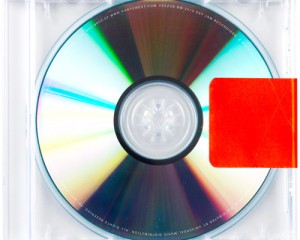Yeezus rises above genre, challenges listeners
“Yeezy season approaching / F-ck whatever y’all been hearing.” So begins Kanye West on “On Sight,” the opening track of Yeezus, his solo follow-up to 2010’s My Beautiful Dark Twisted Fantasy.
To be fair, “Yeezy season” came early this year: Yeezus leaked on June 14 (four days prior to its targeted release date), and one day later West and girlfriend/reality TV star Kim Kardashian became parents to a baby daughter born about a month earlier than expected. Reports and speculation regarding the couple’s daughter are already well underway.
It’s West’s brainchild Yeezus, however, that will be the locus of musical discussion this summer — a win-win for West, whose only defense against accusations of megalomania is a combination of artistic genius and cultural relevance that seems to nip at the heels of his superhuman narcissism.
That same combination thrusts West into uncharted territory on Yeezus. West combines disparate elements of house, trap, dancehall, industrial and jazz into a rhythmic master class that seems far more lean and focused in its execution than the sweeping, cathartic grandiosity of Dark Fantasy.
West also sounds far more engaged lyrically than on Dark Fantasy, although much of West’s emotional detachments on that album were by design. Despite what his newly adapted icy public persona might suggest, the lyrical content on Yeezus is intensely personal.
The album’s production was also significantly pared down by super producer Rick Rubin — a move that undoubtedly lends Yeezus an intense, minimalist aesthetic. Unlike Dark Fantasy, where the devil was in the details and West’s excessive use of them, Yeezus is as ghoulishly lithe as a coked-out runway model.
Armed with only Daft Punk’s plucking synthesizers and an impassioned growl on “New Slaves,” West reconciles “rich n-gga racism” and the unfortunate label of aspirational consumerism appended to black culture in America by breaking down traditional social power structures, rapping “You see it’s leaders … and it’s followers / But I’d rather be a d-ck than a swallower,” along with a host of other unprintable rejections of the American social hierarchy, including the Hamptons.
The album’s undeniable highlight, however, is the six-minute-long “Blood on the Leaves.” West returns to his Auto-tune delivery from 2008’s 808s and Heartbreak in an emotionally exhaustive effort set against vocal samples and piano chords taken from Nina Simone’s cover of “Strange Fruit.” As the track’s tension crescendos to climax, the imperious horn blasts of TNGHT’s “R U Ready” grip the track by the throat. West drops the Auto-tune on the third verse and snarls his way through a furious (and misogynistic) indictment of the hollow façades of the “second string b-tches, tryna get a baby.”
Though West squanders an opportunity to make a socially meaningful statement in the conventional sense (the power invoked by sampling “Strange Fruit” has far more potential for social depth), the management of seemingly irreconcilable ideas and sounds, the use of Auto-tune to signify varying degrees of emotional fracturing and his trademark politically incorrect candor all come together to create a track that is quintessentially Kanye.
Despite the social grandstanding and emotional depth of tracks like “New Slaves” and “Blood on the Leaves,” Yeezus is not above the club banger. The Daft Punk-assisted “Send it Up,” however, is an archetype of the form: alarm-like synths whine over menacing, minimalist bass lines giving the track a hypnotic, head-nodding quality. The infectious beat thankfully drowns out the mediocre rapping on the track, which includes West and guest King L rehashing uninspired tropes about sex, the club and West getting piggyback rides from his bodyguard.
As a rapper, Yeezus sees West at his most confident, as he seems to have grasped full control of his flow — on the opening verse of “On Sight,” West deftly navigates Daft Punk’s breakneck acid-synth syncopations with a playful sprezzatura: “Soon as I pull up and park the Benz / We get this b-tch shaking like Parkinson’s.” And while there are countless instances where the content of his lyrics leave something to be desired (“this the greatest sh-t in the club / since ‘In Da Club’”), they are, for the most part, tightly delivered.
For all the disparate elements Yeezus manages to combine musically, it becomes evident that West’s social statements fall flat against the more pressing issue of his personal struggles. It’s an honest statement of his failure to reconcile the two forces as much as it is a statement that the two forces, in his life at least, will always be in conflict. But being conflicted in pop music has never sounded this challenging while remaining so emotionally powerful and altogether listenable.
So, brace yourselves. Yeezy season is upon us.
